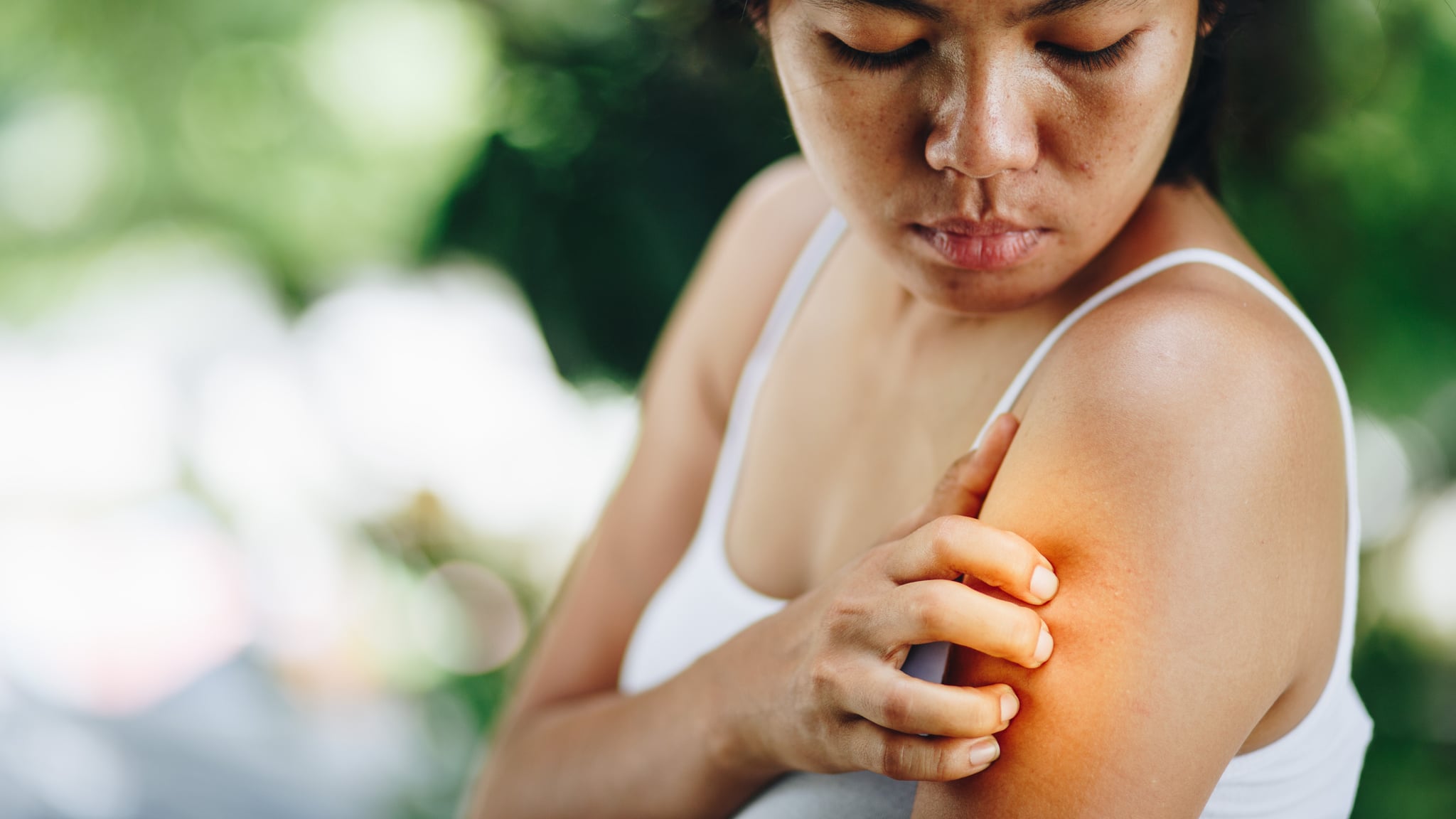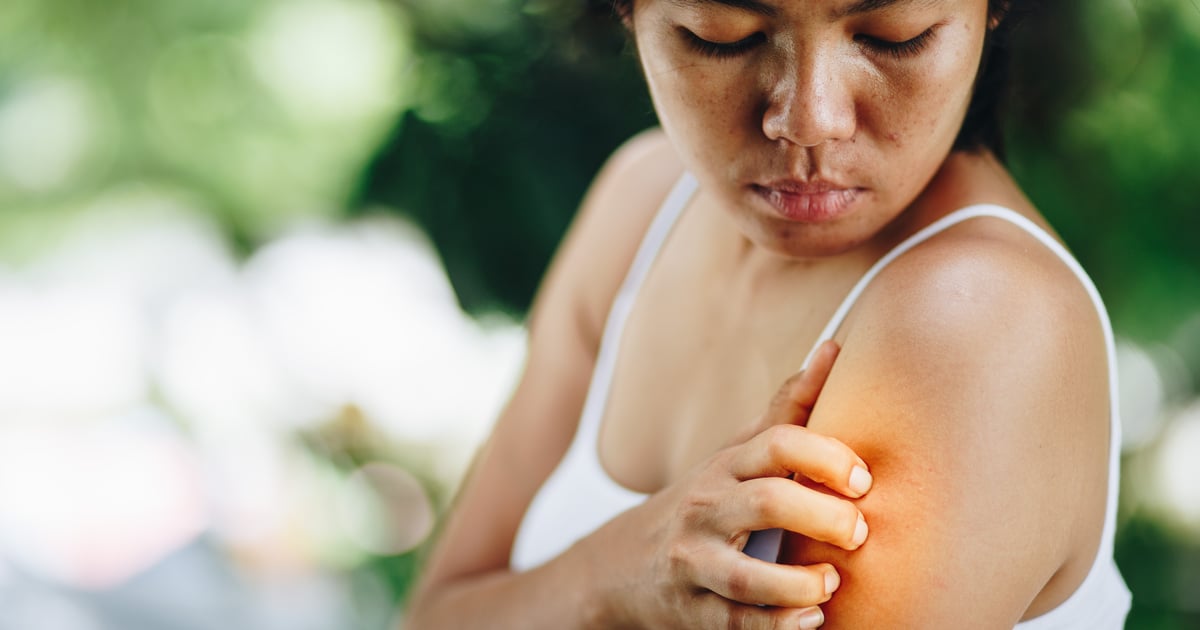
Image Source: Getty / Anupong Thongchan / EyeEm
The COVID-19 pandemic has made people hyperaware of germs — at its peak, sneezing on the train would get you the side-eye. If you had allergies, you might as well have worn a shirt that said “I don’t have COVID” until your symptoms cleared up. And now that we’re dealing with monkeypox, everyone is an armchair infectious-disease expert all over again. Some people have started calling out others with skin conditions in public and on social media, accusing them of having monkeypox. One instance that’s gone viral involves Lilly Simon, a Brooklyn resident who has a genetic condition that causes tumors to grow at her nerve endings. She was recently filmed on the subway without her knowledge by someone who posted the video on TikTok alongside a monkey emoji and a question mark. Simon decided to speak out about the incident on TikTok.
“The tumors are benign but they’re still all over my skin and give me a lot of health complications,” Simon said in her video. “I will not let any of y’all reverse years of therapy and training that I had to endure to deal with the condition and, of course, to exist around people like you.”
@lillysmallsz #stitch with @fuckinfrass i have taken screen shots of the comments will be posting them…everyywhereee. For those of you who were kind thank u. Youre fine. When someone does a background search/google search on yall… theyll see who you really are.do you talk to your colleagues like this? Your patrons?#nf1warrior💚💙 #nf1awareness #nf1fighter #bodyshaming #bodypositivity #streetharrassment
Another incident that surfaced on TikTok involved Jacqueline Nguyen, who said she was forced off of a plane and “interrogated” about her eczema. “They asked me to provide medical documents and told my wife to watch her attitude,” she wrote over a video of her tear-streaked face. “I’ve never been so humiliated in my life.” (Nguyen said in another post that she was able to reboard the flight once she showed airline staff a tube of her prescription eczema cream.) This type of treatment and stigmatization is both dangerous and harmful to people with skin diseases, who have unfairly faced years of discrimination and questions about their skin.
“Skin conditions in general carry a stigma — even those conditions that aren’t contagious.”
For the record, monkeypox “has a characteristic rash that begins at papules and progresses to pustule-like forms,” says Amesh A. Adalja, MD, a senior scholar at the Johns Hopkins Center for Health Security. (Papules, in case you’re not familiar with them, are raised, bump-like spots that can look like acne; pustules are blister-like sores.) Monkeypox also usually — but doesn’t always — causes flu-like symptoms, including fever, chills, exhaustion, and pain, per the Centers for Disease Control and Prevention (CDC). So the odds are decent that people with monkeypox won’t feel comfortable enough to just be out living their lives as usual.
There’s also this to consider, per Thomas Russo, MD, professor and chief of infectious disease at the University at Buffalo in New York: while the US is seeing a monkeypox outbreak (the current official case count is more than 11,000), conditions like eczema and psoriasis are much more common. “Statistically, it’s absolutely more likely that someone out in public would have eczema or psoriasis over monkeypox,” Dr. Russo says.
And, again, there’s the whole othering of people, which is just not OK. “Skin conditions in general carry a stigma — even those conditions that aren’t contagious,” says New York-based board-certified dermatologist Gary Goldenberg, MD, founder of Goldenberg Dermatology. By accusing someone with any kind of visible skin situation of having monkeypox, you’re just adding to the discrimination they face on a daily basis. And it’s not really for anyone other than a doctor to decide whether someone is healthy enough to be in public or not. “It’s such inappropriate, bad behavior,” Dr. Russo says. “It’s not your job.”
If you’re really struggling with the idea of potentially being exposed to monkeypox while you’re out and about, know this: the virus is mostly transferred through close, prolonged skin-to-skin contact — it’s not something you’re likely to pick up at the grocery store, Dr. Russo says. And there are certain precautions you can take to protect yourself from the virus, including washing your hands often, avoiding contact with people who have monkeypox, and getting vaccinated if you are eligible and at risk. Finally, keep this in mind: no one wants to be publicly judged and shamed. If you find that you can’t stop, it may be time to talk to someone about it. Because that’s a you problem — and someone else shouldn’t have to suffer the consequences.
